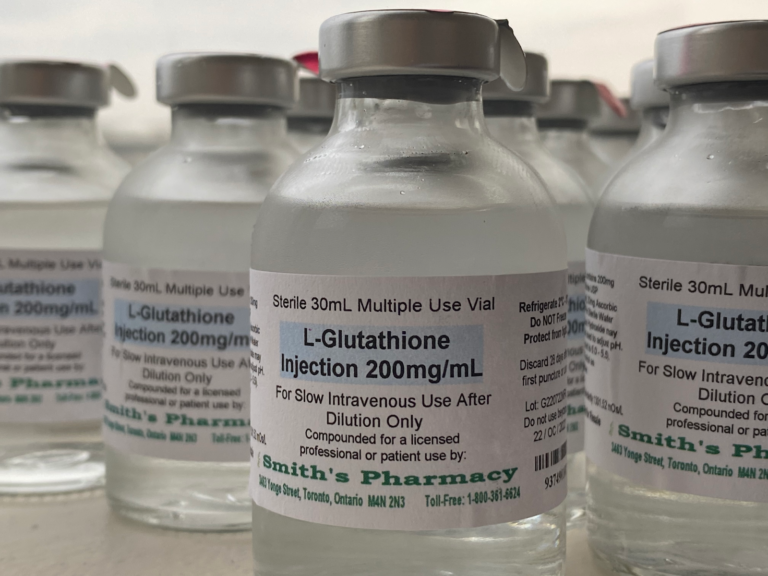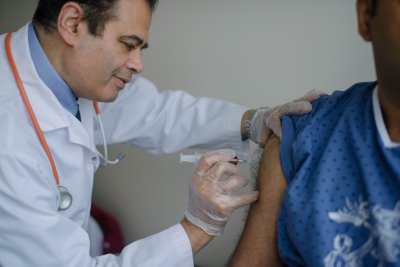Glutathione IV
Glutathione is known as the Master Antioxidant, Its primary purpose is to neutralize free radicals by offering them an oxygen molecule and protecting cells from damage. Glutathione keeps cells healthy and functioning all over the body.
Glutathione is one of 4 amino acids (Including Glutathione, Levocarnitine, Taurine, and Tryptophan) that can be administered Intravenously by Naturopathic Doctors in Ontario.
What are the Glutathione IV indications?
- Chemotherapy Toxicity ( chemotherapy induced neuropathies)
- Liver Support
- Detoxification
- Anti-Aging
- Prevention of oxidative damage (post-stroke, pre-oncologic radiation)
- Neurological support in neurodegenerative illnesses
- For example, Parkinson’s Disease
- Chelates Pb, Hg, Cd, Ar
- Inhibits chemical carcinogenesis
- Helps maintain steady glutathione levels
- Low glutathione is commonly observed in wasting and negative nitrogen balance, as seen in cancer, HIV/AIDS, sepsis, trauma, burns, and athletic overtraining.
- Maintaining and recirculating other exogenous antioxidants such as vitamins C and E
- DNA synthesis and repair, protein synthesis, Prostaglandin Synthesis, amino acid transport, and enzyme activation
- It has a vital function in iron metabolism, anti-viral properties, hepatoprotective, neuroprotective, etc.
- Deactivates tyrosinase leading to inhibition of melanin
Why is Glutathione IV often combined with other IV vitamins in the same visit?
Glutathione needs cofactors to facilitate its function and support the Glutathione level . They are: Vitamin B complex,Vitamin C ,Magnesium ,Zinc, N-Acetyl-Cysteine,L glutamine …etc
What is Glutathione Adverse effects
- Little reported , can be transient Irritability, lightheadedness, headache, dizziness, nausea
Is Glutathione IV Therapy Covered by Health Benefits Plans /Group Insurance?
The Initial IV assessment and subsequent IV visits can be covered under Naturopath , The cost of Injectables are not covered “Glutathione”
Research
Glutathione for Skin Whitening
30 women aged 30 to 50 years in a randomized, double-blind, matched-pair, placebo-controlled clinical trial applied topical Glutathione to one side of the face and a placebo lotion to the other side twice daily for 10 weeks. The conclusion was Topical Glutathione is safe and effectively whitens the skin and improves skin condition in healthy women.
Research link :
https://pubmed.ncbi.nlm.nih.gov/25378941/
Glutathione IV for Anti-Aging and Anti-Melanogenic Effects
A randomized, double-blind, placebo-controlled, parallel, three-arm research for 12 weeks concluded that oral glutathione, 250 mg/d, effectively influences skin properties.
Research link : https://www.ncbi.nlm.nih.gov/pmc/articles/PMC3789163/
Glutathione IV for Liver Health
ALT liver enzymes levels significantly decreased following treatment with glutathione for 4 months. In addition, triglycerides, non-esterified fatty acids, and ferritin levels also decreased with glutathione treatment. This pilot study demonstrates the potential therapeutic effects of glutathione in practical dose for patients with in patients with nonalcoholic fatty liver diseaseNAFLD
Research link https://www.ncbi.nlm.nih.gov/pmc/articles/PMC5549431/pdf/12876_2017_Article_652.pdf
Glutathione IV for Parkinson’s Disease
- Hauser, R. A., Lyons, K. E., McClain, T., Carter, S., & Perlmutter, D. (2009). Randomized, double‐blind, pilot evaluation of intravenous glutathione in Parkinson’s disease. Movement Disorders, 24(7), 979-983.
- Sechi, G., Deledda, M. G., Bua, G., Satta, W. M., Deiana, G. A., Pes, G. M., & Rosati, G. (1996). Reduced intravenous glutathione in the treatment of early Parkinson’s disease. Progress in Neuro-Psychopharmacology and Biological Psychiatry, 20(7), 1159-1170.
References
Smyth JF, Bowman A, Perren T, et al. Glutathione reduces the toxicity and improves quality of life of women diagnosed with ovarian cancer treated with cisplatin: results of a double-blind, randomised trial. Ann Oncol 1997;8:569-73. PMID: 9261526 Cascinu S, Cordella L, Del Ferro E, et al. Neuroprotective effect of reduced glutathione on cisplatin-based chemotherapy in advanced gastric cancer: a randomized, double- blind, placebo-controlled trial. J Clin Oncol 1995;13:26-32. PMID: 7799029 Links M, Lewis C. Chemoprotectants: a review of their clinical pharmacology and therapeutic efficacy. Drugs 1999;57:293-308. PMID: 10193684 Leone R, Fracasso ME, Soresi E, et al. Influence of glutathione administration on the disposition of free and total platinum in patients after administration of cisplatin. Cancer Chemother Pharmacol 1992;29:385-90. PMID: 1312907 Graziano F, Cardarelli N, Marcellini M, et al. A pilot clinical trial of postoperative intensive weekly chemotherapy using cisplatin, epi-doxorubicin, 5-fluorouracil, 6S- leucovorin, glutathione and filgrastim in patients with resected gastric cancer. Tumori 1998;84:368-71. PMID: 9678619 Plaxe S, Freddo J, Kim S, et al. Phase I trial of cisplatin in combination with glutathione. Gynecol Oncol 1994;55:82-6. PMID: 7959273 Locatelli MC, D’Antona A, Labianca R, et al. A phase II study of combination chemotherapy in advanced ovarian carcinoma with cisplatin and cyclophosphamide plus reduced glutathione as potential protective agent against cisplatin toxicity. Tumori 1993;79:37-9. PMID: 8497920 Di Re F, Bohm S, Oriana S, et al. High-dose cisplatin and cyclophosphamide with glutathione in the treatment of advanced ovarian cancer. Ann Oncol 1993;4:55-61. PMID: 8435364 Parnis FX, Coleman RE, Harper PG, et al. A randomised double-blind placebo controlled clinical trial assessing the tolerability and efficacy of glutathione as an adjuvant to escalating doses of cisplatin in the treatment of advanced ovarian cancer. Eur J Cancer 1995;31A:1721. PMID: 7488438 Cascinu S, Frontini L, Comella G, et al. Intensive weekly chemotherapy is not effective in advanced pancreatic cancer patients: a report from the Italian Group for the Study of Dig. Tract Cancer (GISCAD). Br J Cancer 1999;79(3-4):491-4. PMID: 10027318 Cascinu S, Labianca R, Alessandroni P, et al. Intensive weekly chemotherapy for advanced gastric cancer using fluorouracil, cisplatin, epi-doxorubicin, 6S-leucovorin, glutathione, and filgrastim: a report from the Italian Group for the Study of Digestive Tract Cancer. J Clin Oncol 1997;15:3313-9. PMID: 9363860



